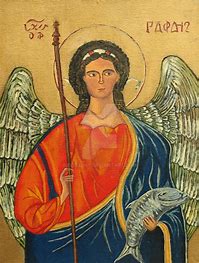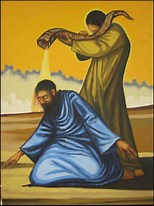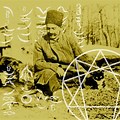King Charles tells religious leaders at Buckingham Palace: 'I will protect the space for faith'









King Charles tells religious leaders at Buckingham Palace: 'I will protect the space for faith'
ng Charles today affirmed his commitment to his role as a religious leader, saying his work must include 'protecting the space for faith itself'.
The newly crowned Monarch, who as King is now the head of the Church of England, also said it was his 'duty to protect the diversity of our country'.
He made the comments during a reception with 30 religious leaders from various faiths at Bucking Palace on Friday.
During the reception, he said he valued differences which people live by, adding: 'I have always thought of Britain as a "community of communities".
'That has led me to understand that the Sovereign has an additional duty - less formally recognised but to be no less diligently discharged.



'It is the duty to protect the diversity of our country, including by protecting the space for faith itself and its practise through the religions, cultures, traditions and beliefs to which our hearts and minds direct us as individuals.'
The King told the reception in the Bow Room at Buckingham Palace how much their words of condolence meant to him after the death of his mother the Queen last week.
He added: 'I also wanted, before all of you today, to confirm my determination to carry out my responsibilities as Sovereign of all communities around this country and the Commonwealth and in a way which reflects the world in which we now live.'
Charles said his own Christian beliefs 'have love at their very heart' and that they 'bound' him to respect those following other religious paths.
He said: 'As a member of the Church of England, my Christian beliefs have love at their very heart.
'By my most profound convictions, therefore - as well as by my position as Sovereign - I hold myself bound to respect those who follow other spiritual paths, as well as those who seek to live their lives in accordance with secular ideals.
'The beliefs that flourish in, and contribute to, our richly diverse society differ. They, and our society, can only thrive through a clear collective commitment to those vital principles of freedom of conscience, generosity of spirit and care for others which are, to me, the essence of our nationhood.
'I am determined, as King, to preserve and promote those principles across all communities, and for all beliefs, with all my heart.



'This conviction was the foundation of everything my beloved mother did for our country, over her years as our Queen.
'It has been the foundation of my own work as Prince of Wales. It will continue to be the foundation of all my work as King.'
The King described himself as a 'committed Anglican Christian' who at his coronation will take an oath relating to the settlement of the Church of England.
He noted he has already 'solemnly' given an oath at his accession ceremony which pledges to maintain and preserve the Protestant faith in Scotland.
There was a gentle ripple of applause as the King left the Bow Room at the palace, stopped for a second, waved and left.
The Archbishop of Canterbury, the Most Rev Justin Welby, the Archbishop of York, the Most Rev Stephen Cottrell, the Dean of Westminster, the Very Rev David Hoyle, and Rev Helen Cameron of the Free Churches Group, were among those who attended the reception.
Imam and Islamic scholar Dr Asim Yusuf and Bishop Kenneth Nowakowski of the Ukrainian Catholic Eparchy were also among the guests.
Reference: James Robinson for MailOnline -
John Paul I, briefly serving, 'smiling" pope, is beatified










John Paul I, briefly serving, 'smiling" pope, is beatified
VATICAN CITY (AP) — Pope Francis on Sunday beatified one of his predecessors, John Paul I, a briefly serving pontiff who distinguished himself with his humility and cheerfulness, and whose abrupt death in his bedroom in 1978 shocked the world and fueled suspicions for years about his demise.
The ceremony in St. Peter's Square constituted the last formal step in the Vatican before possible sainthood for Albino Luciani, an Italian who died 33 days after being elected pontiff.
"With a smile, Pope John Paul managed to communicate the goodness of the Lord," Francis said in his homily.
 The tapestry depicting late Pope John Paul I hanging from the facade of St. Peter's Basilica, is unveiled during the beatification ceremony led by Pope Francis at the Vatican, Sunday, Sept. 4, 2022. (AP Photo/Alessandra Tarantino)© Provided by Associated Press
The tapestry depicting late Pope John Paul I hanging from the facade of St. Peter's Basilica, is unveiled during the beatification ceremony led by Pope Francis at the Vatican, Sunday, Sept. 4, 2022. (AP Photo/Alessandra Tarantino)© Provided by Associated Press"How beautiful is a church with a happy, serene and smiling face, that never closes doors, never hardens hearts, never complains or harbors resentments, isn't angry, does not look dour or suffer nostalgia for the past,'' the pontiff said.
Francis then encouraged people to pray to the newly beatified churchman to "obtain for us the smile of the soul.”
Last year, Francis approved a miracle attributed to the intercession of John Paul I — that of the recovery of a critically ill 11-year-old girl in 2011 in Buenos Aires, the hometown of the current pope. Now a young woman, Candela Giarda told a Vatican press conference last week via a video message that she had wanted to attend the ceremony but couldn't because she recently broke a foot working out in a gym.

For Luciani to be declared a saint, another miracle, following his beatification, must be attributed to his intercession and certified by the Vatican.
Seated under a canopy outside St. Peter’s Basilica, Francis led the ceremony, which was punctuated by booms of thunder, flashes of lightning and pouring rain, prompting cardinals, bishops, the choir and thousands of rank-and-file faithful in the square to open umbrellas.
But by the end of the ceremony, the sun was shining, and Francis, waving while seated in a popemobile, toured the square, waving to the crowd, some of whom shouted, “Long live the pope!”
When elected pontiff on Aug. 26, 1978, Luciani, 65, had been serving as patriarch of Venice, one of the church's more prestigious positions. In that role as well as that previously as a bishop in northeastern Italy, Luciani sounded warnings against corruption, including in banking circles.
 The tapestry depicting late Pope John Paul I hangs from the facade of St. Peter's Basilica during the beatification ceremony led by Pope Francis at the Vatican, Sunday, Sept. 4, 2022. (AP Photo/Andrew Medichini)© Provided by Associated Press
The tapestry depicting late Pope John Paul I hangs from the facade of St. Peter's Basilica during the beatification ceremony led by Pope Francis at the Vatican, Sunday, Sept. 4, 2022. (AP Photo/Andrew Medichini)© Provided by Associated PressIn his short-lived papacy, which concluded with the discovery of his body in his bedroom in the Apostolic Palace, John Paul I immediately established a simple, direct way of communicating with the faithful in the addresses he gave, a style change considered revolutionary considering the stuffiness of the environment of church hierarchy.

Those who have campaigned for him to someday be made a saint have stressed his deep spirituality and his tireless emphasis on key Christian virtues — faith, hope and charity.
John Paul “lived without compromise,'' Francis said, praising him as mild-tempered, humble pastor.
Luciani overcame “the temptation to his own self at the center and to seek one's glory," the pontiff said.
The Vatican said John Paul died of a heart attack, but no autopsy was done. It gave conflicting versions of the circumstances of how his body was discovered. First it said that a priest who served as his secretary found him, but later acknowledged John Paul was found dead by one of the nuns who brought him his customary morning coffee.

With a huge financial scandal developing at the time in Italy involving figures who had links to the Vatican's bank, suspicions quickly took root in the secular media that perhaps Luciani was poisoned because he intended to root out wrongdoing.
Books speculating on the circumstances surrounding his death sold millions of copies.___
Alessandra Tarantino contributed to this report.





By FRANCES D'EMILIO, Associated Press
What is the future of Russian Jewry? Rabbis convene emergency conference










What is the future of Russian Jewry? Rabbis convene emergency conference
Seventy-five leading Russian rabbis will reiterate their collective commitment to “not abandoning their communities and staying with them to provide spiritual, psychological and emotional support, no matter how complicated things get,” in an emergency conference in Moscow on Monday, according to the Federation of Jewish Communities of Russia, an organization affiliated with Chabad.
The rabbis attending the conference are representing 400 of their colleagues from across the country, the federation said in a press release.
One of the purposes of this conference is to counter the assumption in the Jewish world that all of the Jews in Russia are interested in an exodus from the country, it said.
“There is a lot of fear and uncertainty for the Jews in Russia,” the federation said. “They are told by people outside Russia that their only option is to give up their homes and lives and flee abroad. This has only been compounded by what appears to be the Russian government’s attempt to shut down the Jewish Agency. Yet the vast majority of Russian Jews have chosen to remain.”
How have religious leaders been handling the war?

"There is a lot of fear and uncertainty for the Jews in Russia."
Federation of Jewish Communities in Russia
Since the start of the war in Ukraine in February, many members of Russia’s non-Jewish clergy have voiced their unabashed support for the invasion. A smaller number of clergy have chosen to speak out against the government’s policies and leave the country.
From the beginning of the war, the Russian rabbis have chosen a third approach: to remain with their congregations and communities while simultaneously calling for immediate peace and an end to the bloodshed. An exception was Rabbi Pinchas Goldschmidt, the former chief rabbi of Moscow who criticized Russia and fled the country.

“Meanwhile, some voices in the West have demanded that rabbis sacrifice the Jewish community’s safety by publicly attacking the government,” the federation said in a veiled reference to Goldschmidt.
At the conference, the rabbis will pledge to “continue leading their communities and not abandoning them during these difficult times,” the federation said, adding that they will also issue a joint appeal for peace and an immediate end to the bloodshed.
Meanwhile, Israel’s chief rabbis and leaders, including President Isaac Herzog, have sent letters of support and encouragement to Russia’s rabbis for their “heroic” efforts.
Reference: By ZVIKA KLEIN: Jerusalmen Post.
Kabul: 21 killed and dozens injured in ‘suicide attack’ on mosque in Afghan capital









Kabul: 21 killed and dozens injured in ‘suicide attack’ on mosque in Afghan capital
Abombing at a mosque in the Afghanistan capital of Kabul during evening prayers on Wednesday has killed at least 21 people, including a prominent cleric, and wounded at least 33.
There was no immediate claim of responsibility for the attack, the latest to strike the country in the year since the Taliban seized power. Several children were reported to be among the wounded.
The so-called Islamic State (IS) group’s local affiliate has stepped up attacks against the Taliban and civilians since the former insurgents’ takeover last August as US and Nato troops were in the final stages of their withdrawal from the country.
Last week, IS claimed responsibility for killing a prominent Taliban cleric at his religious centre in Kabul.
According to an eyewitness, a resident of the city’s Kher Khanna neighborhood where the Siddiquiya Mosque was targeted, the explosion was carried out by a suicide bomber.
The slain cleric was Mullah Amir Mohammad Kabuli, the eyewitness said, speaking on condition of anonymity because he was not authorised to talk to the media.
He added that more than 30 other people were wounded. The Italian Emergency hospital in Kabul said at least 27 wounded civilians, including five children, were brought there from the site of the bomb blast.
There were fears the casualty numbers could rise further.
Khalid Zadran, the Taliban-appointed spokesman for the Kabul police chief, confirmed an explosion inside a mosque in northern Kabul but would not provide a casualty toll or a breakdown of the dead and wounded.
Taliban spokesman Zabihullah Mujahid also condemned the explosion and vowed that the “perpetrators of such crimes will soon be brought to justice and will be punished”.
A US-led invasion toppled the previous Taliban government, which had hosted al Qaeda leader Osama bin Laden in Afghanistan, following the September 11 2001 terrorist attacks in the United States.
Since regaining power, the former insurgents have faced a crippling economic crisis as the international community, which does not recognize the Taliban government, froze funding to the country.
Separately, the Taliban confirmed on Wednesday that they had captured and killed Mehdi Mujahid in western Herat province as he was trying to cross the border into Iran.
Mujahid was a former Taliban commander in the district of Balkhab in northern Sar-e-Pul province, and the only member of the minority Shiite Hazara community among the Taliban ranks.
Mujahid had turned against the Taliban over the past year, after opposing decisions made by the group’s leaders in Kabul.
Reference: ES: Evening Standard: Michael Howie -
Articles-Latest
- Koran burning conviction sparks fury as blasphemy law 'returns to UK'
- Robert Francis Prevost - Pope Leo XIV
- Pope Francis' death follows recent health challenges. Here's what we know about how he died.
- Easter April 2025 - international Celebrations
- The Rule of the twelve psalms -Worthy is the Lamb
- Religion in Africa Before Christianity and Islam
- 6 The Origin of Yahweh
- Dumo Di Milano
- What Did the Crow Tribe Believe In: Discover The Beliefs!
- 7 Reasons Historic Christianity Rejects the Book of Enoch
- 8 Breathtaking Mountain Monasteries Around the World
- Ethiopian Bible is oldest and most complete on earth
- Muhammad Muhammad was a prophet and founder of Islam.
- World Day of the Poor – SVP Christmas Campaign 2024
- Pope Francis to open 5 sacred portals on Christmas Eve — for a ritual that’s never been done before
- The 144,000 in Revelation
- Over 73 dead bodies 'used for meditation', 600 crocs in a pond, found in two Thai temples
- Occultism: Western Occult Tradition
- What is a Mudra
- Blood Sacrifices: Ancient Rituals of Life and Death
Articles-Most Read
- Home
- Let There Be Light
- Plants that feel and Speak
- The Singing Forest
- The Singing Forest-2
- Introduction
- Meditation
- Using Essential Oils for Spiritual Connection
- Heaven Scent
- Plants that Feel and Speak-2
- Purification
- Making the Spiritual Connection
- Anointing
- Essential Oils: The unseen Energies
- The Sanctity of Plants
- The Aroma Of Worship-Foreward
- The Aroma Of Worship - Introduction
- Methods Of Use
- Spiritual Blending
- Handling and Storage









